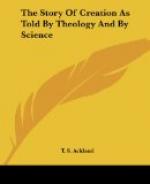The second characteristic of that state of mind is its admiration of the startling and the vast. In these alone it recognizes the tokens of unlimited power. It is unable to appreciate those more majestic manifestations of power which are discerned by the enlightened eye, when a stupendous scheme is developed, gradually and imperceptibly, but without pause or hesitation through a long succession of ages; when a multitude of seemingly discordant elements are at last brought together in a perfect work; when a power, unseen and unnoticed, slowly but surely overrules the working of ten thousand apparently independent agents, through a thousand generations, and moulds their separate works into one harmonious whole. Such a manifestation of power as this was beyond the grasp of the untrained mind; but to such intellects there was something irresistibly fascinating in the idea of a world rising into perfect existence in a moment, of innumerable hosts of living creatures called into being at a word. Such was the meaning of the account of creation which naturally suggested itself to the untrained mind, and there was nothing in science in those early days to throw any doubt upon it, and so this belief was unhesitatingly and almost universally adopted. Here and there, indeed, some man of deeper thought than his brethren, such as St. Augustine [Footnote: See St. Augustine, “De Genesi ad Literam,” Liber Imperfectus, and Libri Duodecim, and also “Confessionum” Liber xiii.], suspected that there might be more in that seemingly simple record than was generally acknowledged; but such men had no means of verifying their conjectures, and their number was very small. For three thousand years the old view was practically unquestioned, it received the tacit sanction of the Church, it gradually became identified in the minds of all with the record itself, and was as much an article of faith as the very Creed.
This was the state of things, when at last science awoke from its long slumber, and began for the first time to employ its energies in the right direction. Very soon discoveries were made which startled the minds of all believers in the Bible. The first shock which the old belief sustained was from the establishment of the Copernican view of the Solar System. That the world was the immovable centre of the universe, around which sun, moon, and planets moved in their appointed courses, was universally held to be the express teaching of the Bible; and when Galileo ventured to maintain the new views in Italy, the Roman Curia took up the question, and by the agency of the Inquisition wrung from him a reluctant retractation of his so-called heresy. But it was of no avail. The new doctrine was true, and it could not be crushed. Fresh evidence of its truth was continually coming forward, till at last it was universally received. Then the defenders of the Bible had recourse to the suggestion that as the Bible was not intended to teach us science, such errors were of no consequence, But




